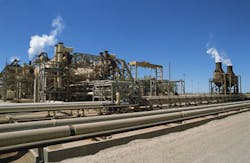Saudi Arabia may be ready to make a radical change that has not been witnessed for decades. Next year the country may hike the price of its natural gas, which is currently the lowest in the world, in a bid to tackle energy waste and cut high-cost subsidies, according to the International News.
If Saudi Arabia raises natural gas prices the industry is likely to see dramatic changes, not just on the domestic front but internationally as well. As an immediate consequence, the competitiveness of the country's petrochemicals industry is at risk of taking a blow, industry experts believe. Saudi Arabia keeps its gas selling price low thanks to the significant government subsidies paid out of the hundreds of billions of dollars made from crude oil exports. However, this practice has triggered complaints to the World Trade Organization (WTO) by China and India, whose own petrochemical companies are in direct competition with Saudi Arabia.
Because of the low prices that the government has been maintaining for years, energy-related industries have been developing successfully in Saudi Arabia. Domestic industrial users have been charged $0.75 per million British thermal units (mmbtu), which is several times cheaper than prices globally. This price, however, was established decades ago, when natural gas resources seemed endless and Riyadh insisted on keeping prices low, despite rising production costs, in the hope that domestic businesses would find it easier to grow and create much-needed jobs for the increasing population.
RELATED: Dow to build new coating materials plant in Saudi Arabia
Saudi Arabia is apparently finding it difficult to keep prices low, as sources that allow cheap production are running low and the problem is intensified by waste. These factors, combined with rising demand, are forcing Saudi Arabia to consider tapping offshore and unconventional natural gas sources, which are much more expensive to operate.
Riyadh has already tried various ways to deal with waste but with only moderate success. One of the projects requires petrochemical companies to provide more technologically advanced equipment that reduces waste before they are actually granted access to natural gas in the first place.
Experts believe that hiking the domestic selling price would result in a double-tier benefit — saving billions of dollars in subsidies, while on the other hand discouraging waste. According to an unnamed Saudi industry source close to the government and its stance on the matter, quoted by the International News, there are plans to hike the gas price and this is fueled by two main concerns for the government: the shortage of gas and its inefficient use. The source added that there are no fixed action plans on the issue but it is expected that moves will be made by the end of next year.
According to Kamel al-Harami, an independent Kuwaiti oil analyst, even if Saudi Arabia decides to increase prices next year, the hike will be small and calculated in such a way as to do no harm to the domestic petrochemical industry, which is heavily dependent on natural gas as a raw material.
